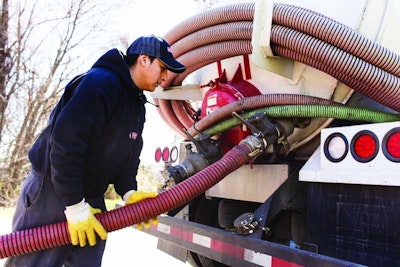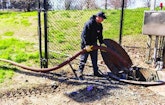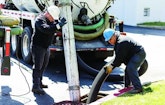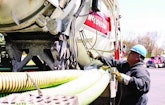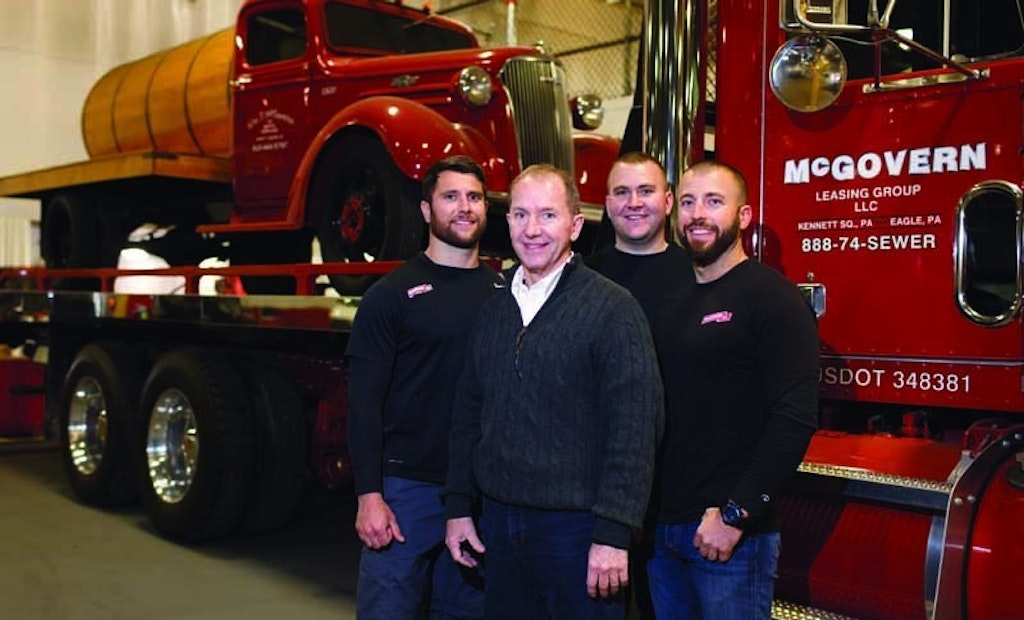
Interested in Industrial?
Get Industrial articles, news and videos right in your inbox! Sign up now.
Industrial + Get AlertsWhen Bill McGovern was last featured in Pumper magazine, he was already an industry veteran with more than three decades at the helm of a successful Philadelphia-area septic pumping business. But the owner of Wm. P. McGovern Inc. kept looking for opportunities. In the 10 years since, the business has doubled in size, and late last year consolidated satellite offices into a large central headquarters.
Acquisitions while maintaining a high level of customer service — the same factors that led to early success — have continued to be the keys, says McGovern.
“Just buying smaller companies is how I’ve grown over the years,” he says. “You buy one here, you buy one there, and eventually their customers become yours. I think that’s the best way to grow. And our service is the other thing. We’re basically a 24/7 operation.”
GROWING OVER THE YEARS
Wm. P. McGovern Inc. is based in West Chester, Pennsylvania, where the company moved into its new headquarters last September — a 68,000-square-foot former Pepsi distribution warehouse. The 200-mile-radius service area covers parts of four states (Pennsylvania, New Jersey, Maryland and Delaware), and a team of 76 employees provides a variety of services from septic pumping and portable restroom rentals to bulk waste hauling, excavation, and onsite installation and repair. A sister company, McGovern Environmental, was founded in 2006 when the menu of services grew further thanks to the addition of industrial vacuum loading equipment.
The company owns more than 200 pieces of equipment, including three Presvac Powervac 3800 industrial loaders, 40 vacuum trucks, 25 tractor-trailers, six portable sanitation service trucks and six box trucks with jetters (US Jetting). Peterbilts and Macks make up the truck fleet. Most of the tanks come from Vacuum Sales out of New Jersey, and Masport is the primary pump supplier. On the portable restroom side, the company owns about 1,000 PolyJohn units. The excavation division is equipped with three backhoes, two skid-steers, a bulldozer (CASE Construction Equipment) and four Peterbilt dump trucks.
That shows how much Wm. P. McGovern Inc. has grown over four decades, after McGovern started the company in 1974 when he was just 18. The driving factor behind much of the growth has been acquisitions, both initially and in recent years. In total, McGovern has acquired about seven other businesses, but the company doubling in size the last decade was bolstered by one buyout in particular.
“I bought a pretty good-sized company back in 2006. That really gave me a boost,” McGovern says. “That one included 15 tractor-trailers, two Presvac units and around seven pumper trucks. The others were small two- or three-truck operations.”
BUY CAUTIOUSLY
McGovern says he is always on the lookout for buying opportunities. That is perhaps why he has often been approached by business owners looking to sell. About half of his acquisitions have been completed that way. McGovern says the primary lesson he’s learned is the importance of having trust in the person you’re buying from.
“Once you sit down and talk to them, you can figure out whether you can trust them or not,” McGovern says. “If you have a good idea from the start what the company is all about, it’s easier to bring them under your wing and make the changes you need to. I usually let the seller tell me what they want for the business and then I take it from there.”
There are challenges associated with acquisition-based growth though, McGovern notes. First, though he does his due diligence when evaluating equipment, he says there is still a chance of something suddenly breaking down without warning. Second, the primary reason for buying another company is to expand the customer base, and while the opportunity is there, it is not a given.
“You don’t know what you’re buying exactly when you purchase that customer list,” McGovern says. “It’s not guaranteed that you’re getting those customers. You’re getting their phone calls at first, but they might call you the one time and not the next time. You never know.”
That’s where McGovern’s dedication to quality and prompt service provides some assurance that a newly acquired customer list has a strong chance of turning into paying customers.
“We run seven days a week pretty hard,” McGovern says. “We’re typically operating from about 3 a.m. to 7 p.m. We’re not shut down for too long. That’s how we’ve grown over the years — taking calls that others won’t go on because it’s an inconvenient time.”
GREASE RELIEF
Grease trap work has been a significant growth area for the company in recent years, largely because of its ability to respond immediately to emergencies.
“We do work for a lot of food chains in the cities, like Philadelphia and Baltimore,” McGovern says. “I think it’s our level of service that has helped. When you have a grease problem, it’s always at night or on weekends, and a lot of businesses don’t answer the phone. We even have competitors recommending us on weekends.”
Grease trap work makes up about 25 percent of the workload, about equal to the amount of residential septic pumping the company now takes on. With a large service area, providing a quick response to grease trap emergencies is the top challenge, says McGovern, but the company is typically able to keep the response time for even the farthest service calls to four hours or less.
“When you’re 100 miles away, it’s hard to get there as fast as the customer would like you to, but we manage it,” he says. “Some of the food chains we deal with want you there within four hours regardless of the time of day. That’s in the contract for some of them. If you can’t do it, you don’t get the business.”
THE CREW IS READY
Having dedicated technicians on call at any given time is McGovern’s answer to providing quality emergency service. Many are longtime employees. Every day, the company has two vacuum truck drivers, two tractor-trailer drivers and one portable restroom technician on call. One dispatcher is also on call.
“We run it just like we do during the day,” McGovern says. “The dispatcher takes the call and then calls one of the drivers.”
The many years of experience have helped McGovern gauge a good number of drivers to keep on call. Because of the growth of the company, a six-week rotation is used. Reliable 24/7 emergency service is maintained while still allowing reasonable work schedules for crew members. “A driver has to worry about being on call only one week about every two months,” McGovern says.
Establishing the new central headquarters rather than having three smaller satellite offices was another of McGovern’s solutions for responding quickly to calls over a large service territory. One satellite office still exists in Kennett Square, where the onsite installation and repair business is located, but all other operations are based out of West Chester. The facility is located between the two offices that were consolidated.
“It’s a 15-acre facility and right on a main access highway,” McGovern says. “It helps to have everything under one roof. Ten years ago, we were serving about a 100-mile radius, but we’ve moved into New Jersey and Maryland more heavily — partly because of the businesses we’ve bought out — and are running farther out.”
FUTURE INVOLVES FAMILY
McGovern’s four children have become more involved in the family business in recent years. His oldest son, Bill Jr., 32, is a service technician. Middle son, Stephen, 30, is a diesel mechanic and in charge of the company fleet. His youngest son, Andrew, 26, holds an engineering degree and does a lot of the company’s refinery work where his expertise is beneficial.
His daughter, Morgan, 20, has also done some part-time bookkeeping work while she continues in business school.
Though McGovern is still a hands-on business owner, he says planning for the future is helped by his children’s involvement. All own shares of stock in the company.
“With my family being here, it’s easier to get out and look at ways to expand,” McGovern says. “You know you have someone here with interest who you can trust.”
But it’s not yet time for Wm. P. McGovern Inc. to start preparing to implement a full-on succession plan.
“I’m still at it,” McGovern says. “I work six days a week, about 10 hours a day, and I’m not going anywhere. I just turned 60 and I’m still loaded with energy for some reason.”
She’s going strong at 90
Bill McGovern has been in the septic service business for a long time, starting Wm. P. McGovern Inc. in 1974. But there is another family member who surpasses McGovern’s longevity — his mother, Helen. At age 90, she has been involved in the industry for nearly 60 years, first as manager of one septic company and then assisting with her son’s startup.
She continues to work to this day, reporting to the company’s West Chester, Pennsylvania, headquarters four days a week to do payroll and handle the bills following McGovern’s approval.
“She’s still pretty active,” McGovern says. “She’s been handling the same duties here since we started.”
In 1958, Helen began working for John F. Lynch Septic after the death of her husband.
“There was no real attraction to the business,” she says. “I just needed a job to support four small children on my own.”
McGovern was 2 years old at the time, and over the subsequent years he often had to tag along with his mother to work.
“We didn’t have a babysitter, so I always went to work with her,” he says. “After school I would be sitting there with her and that’s how I kind of started to learn the business.”
When the owner of the business died and the company switched hands in the early 1970s, Helen wasn’t kept on. It was not long after, though, that she was helping McGovern launch his own pumping company. John F. Lynch Septic didn’t end up surviving under the new ownership, and the McGoverns found themselves purchasing the company’s assets, establishing the acquisition trend that has led to much of Wm. P. McGovern Inc.’s growth.
While Helen’s start in the pumping industry may have been solely out of necessity, she’s enjoyed the many years since, which is why she still finds herself coming to work regularly.
“I’ve enjoyed meeting and talking with people,” she says. “It’s been very exciting to help my son grow the business and amazing to see it go from one customer to almost 65,000 customers.”
And McGovern says he’s learned a lot working alongside his mother all these years.
“Just being honest with people,” he says of the biggest lesson. “She’s probably the most honest person I know. And being nice. She’s always smiling.”
